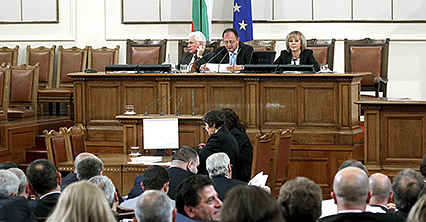
The deputies agreed to establish a new permanent committee in the parliament to interact with civil organizations and movements as part of the new rules for the organization and procedure of the National Assembly.
The new committee will exercise the dialogue and the interaction with the representatives of civil organizations and will organize public discussions on issues of high interest to the society. The committee will consider the proposals for referenda and the initiatives of the public ensuing from the Direct Citizen Participation in the State and Local Government Act, and will consider the petitions envisaged in the Constitution.
The composition of the committee is based on the parity principle – comprising 3 deputies from each parliamentary group. Public Council consisting of representatives from civil organizations and movements will be created to advise and consult the committee. It was decided to broadcast in the Internet the meetings of the committee.
The MPs agreed also that in the so called “day of the opposition” all parliamentary groups will be able to table proposals to the agenda of the assembly. As a rule each first Wednesday of the month the opposition parties may submit proposals to the agenda. The rules of the previous Assembly prevented the ruling party (with the highest number of MPs) from submitting bills on the first Wednesday of the month. In the current parliament the largest parliamentary group of GERB is in opposition so this rule will not apply.
The MPs further voted that the Prime Minister and his deputies should appear in parliament to answer oral questions concerning matters of the general policies of the government, every first Wednesday of the month, during the last hour and a half of the plenary sitting.
The questions during the blitz control should not request detailed information containing numbers and statistics. Each parliamentary group has the right to 2 questions of current importance, while all MPs who do not belong to a parliamentary group would have the right to 2 questions in total.
Cabinet members will also be subject to blitz control held before the parliamentary committees in charge of their sectors. Members of the government will answer oral questions of current importance each first Wednesday or Thursday of the month in the last hour and a half of the sittings of the permanent committees.
The traditional parliamentary control held on Friday remains as well. The National Assembly will hear the questions, the enquiries and the replies during the last 3 hours of the plenary sittings held on Friday, except if the Assembly decides otherwise.
The answers to the submitted questions and enquiries will be recorded immediately in a public register and published on the web page of the National Assembly under the title “Parliamentary Control”.

- 22/04/2021
The Parliament imposed a moratorium on concessions, real estate deals and appointments pending the election of a new cabinet or caretaker government - 16/04/2021
By 156 votes “in favour”, the National Assembly accepted the resignation of the Council of Ministers with Prime Minister Boyko Borisov - 15/04/2021
Speech by Mrs. Iva Miteva upon her election as a President of the 45th National Assembly - 15/04/2021
The Member of Parliament Iva Miteva was elected President of the 45th National Assembly - 15/04/2021
The Members of the 45th National Assembly were officially sworn in - 03/03/2021
The President of the National Assembly Tsveta Karayancheva and MPs attended the solemn fireworks-retreat on the occasion of the Liberation of Bulgaria - 03/03/2021
Every Bulgarian should preserve and honour the memory of those glorious ancestors, thanks to whom Bulgaria exists today, said the President of the National Assembly Tsveta Karayancheva in Gabrovo - 03/03/2021
Today we are on Shipka to pay our respects to all the heroes who sacrificed their lives for freedom, said the President of the National Assembly Tsveta Karayancheva after climbing Shipka Peak together with young people from all over the country - 02/03/2021
The Vice-President of the National Assembly Valeri Simeonov received an award from the Bulgarian Republican Self-Government in Hungary - 26/02/2021
The Parliament adopted at second reading amendments to the Measures Against Money Laundering Act
 Български
Български English
English